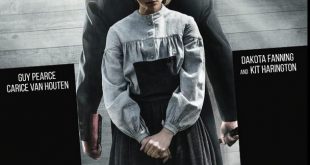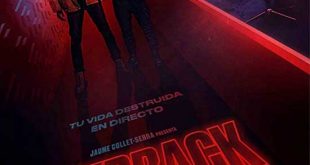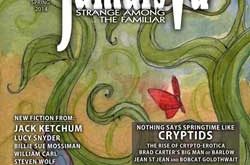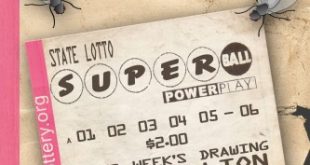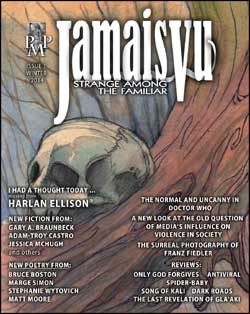 For a very, very short amount of time, back in the mid-1990’s, just after Headbanger’s Ball was cancelled, there was a show on MTV called SuperRock (bear with me here, this will make sense shortly). Rather than only playing heavy metal videos, SuperRock covered a wider variety. On a normal night, you might catch a Bad Religion video, then a Faith No More video, and then a Public Enemy video. They essentially tapped into a certain audience of skaters and “cool kids” by giving a little bit of everything not on regular mainstream rotation during the rest of MTV’s schedule. In early 2014, Paul Anderson and Post Mortem Press have brought to you what I believe is the literary equivalent of SuperRock, and it is called Jamais Vu. Let me explain…
For a very, very short amount of time, back in the mid-1990’s, just after Headbanger’s Ball was cancelled, there was a show on MTV called SuperRock (bear with me here, this will make sense shortly). Rather than only playing heavy metal videos, SuperRock covered a wider variety. On a normal night, you might catch a Bad Religion video, then a Faith No More video, and then a Public Enemy video. They essentially tapped into a certain audience of skaters and “cool kids” by giving a little bit of everything not on regular mainstream rotation during the rest of MTV’s schedule. In early 2014, Paul Anderson and Post Mortem Press have brought to you what I believe is the literary equivalent of SuperRock, and it is called Jamais Vu. Let me explain…
Jamais Vu is a self-described experiment; the publishers know there are a lot of great short stories out there, but they also know that 500+ page anthologies tend to not get read by many people other than those who are published in the anthology (I know, I’ve been in one of those). Enter this new magazine. In each issue, the publisher promises to deliver a collection of dark poetry and prose, some non-fiction work, some articles, and some reviews. In other words, a little something for everyone, just like the afore-mentioned SuperRock.
Issue number one starts out with a dark, depressing tale by Gary Braunbeck called “Photo Captions,” a story told through short bits of info, each describing a photo in a scrapbook and all coming together in a horrifying climax. From there, we flow straight into a poetry section with selections by Stephanie M. Wytovich, Matt Moore, and Marge Simon. “Bait” is a short, dark story by Michael Kelly about a child whose parents are gone and so he now lives with his uncle. But there’s something about his uncle, something primitive, something secretive, that haunts the child’s thoughts. We’ve got a handful of book reviews, and then an article about the many incarnations of Doctor Who that fans are bound to love (and non-fans, like myself, can still find interesting).
And then we reach “Another Pleasant Valley Sunday,” by Jessica McHugh (you may remember that name from my reviews of her books Food For Thought and The Green Kangaroos). Everything to this point in the issue has been good, then this story raises the bar. It’s a very Twilight Zone/Stepford Wives-styled, suspenseful little thriller about a guy who’s down on his luck and is just trying to run away, and decides the first step in his new life is having a drink and a bite to eat at some random bar that he’s never heard of before in some city between the past that he’s trying to escape and the future that he hopes might be a little bit brighter. Instead, he finds a tiny town called Pleasant Valley where everything seems to be designed just for him. But as we’ve so often seen before, this doesn’t ever seem to end well.
“Video Nasties” is another one that’ll linger in your head after reading. Written by Max Booth III (author of Toxicity and Black, among others), it’s the story of two kids, Jeremy and Eddie, who look for a cure to their suburban boredom. That fun begins “innocently” enough with a trip to the mall for a little casual shoplifting, but takes a horrible turn for the worse when they decide to get a little kid lost. Sprinkled throughout are little snippets of familiar horror movie scenes, some we will recognize from movies like The Texas Chainsaw Massacre, Cannibal Holocaust, The Last House of the Left, I Spit on Your Grave, and others. The story is somewhat reminiscent to that of the West Memphis Three kids and also asks the question, did the movies make the kids do this? Following the story are a few articles that discuss both sides of the debate and go into further detail regarding violence in the media and its effects.
The second half of the issue presents some movie reviews as well as rundown of a handful of “strange movie” suggestions. We get a storytelling moment from Harlan Ellison, who details a past encounter with a famous criminal with typical Harlan Ellison delivery. More poetry by Bruce Boston. A couple dark comic strips, a brief retrospective of the photography of Franz Fiedler featuring skeletons and naked women (an early influence of Girls & Corpses magazine, perhaps?), and a few more short stories.
“Shiva” is by Cameron Suey, and it’s about a guy who gets the call to come home when his brother dies. But when he gets there, he finds himself struggling to determine what is dream and what is reality as his brother, the one who has died begins to not only appear to him, but has conversations with him. In “The Hydra Wife,” by Sandra M Odell, a married couple tries to work through wife Anya’s schizophrenia. Victor tries his best to be the knight in shining armor for his wife, but sometimes it’s overwhelming, and it begins to feel more like a battle against a multi-headed hydra. Will he be able to come to a middle ground, a life in which they can still coexist the way they had hoped ever since they fell in love? Or will he be too frustrated, too tempted to reach out for the warm touch of another?
The final story of the issue is called “Another Friendly Day in the Antique Trade,” and it’s by Adam-Troy Castro. I was not previously familiar with Castro, but then I read the opening line and became an instant fan: “I was looking out the shop window when the mouth in the sidewalk ate poor Otis Hinkman.” And no, that is not symbolism. This story is about a small town that has a mysterious creature living just under its streets that randomly eats people. It’s tough to tell what is more disturbing, the monster sneaking up on and eating the citizens, or the fact that the people are so used to it they’ve almost become complacent. Castro gives us the history of the city, builds his character and makes us like them, and introduces tension and curiosity into the story when strangers Jack and Laura Marshall enter the small town antique shop and interact with owners Burt and Chip. Without giving too many details, the story is fun, it grabs your attention and doesn’t let go, and it’s written very well, a perfect close to the issue.
If you’re a fan of all things dark fiction, Jamais Vu is a perfect addition to your library. It’s got poetry and prose, movie and book reviews, opinion pieces, articles…a little bit of something for everyone. This being just the first issue, you know things will only get better, and seeing how they’re starting in such a good position, I can’t help but to feel excitement for what is to come. Paul Anderson and company have something very cool in their hands. This is the SuperRock of the dark fiction world, and I can only hope it lasts much longer.
 Horror News | HNN Official Site | Horror Movies,Trailers, Reviews
Horror News | HNN Official Site | Horror Movies,Trailers, Reviews
